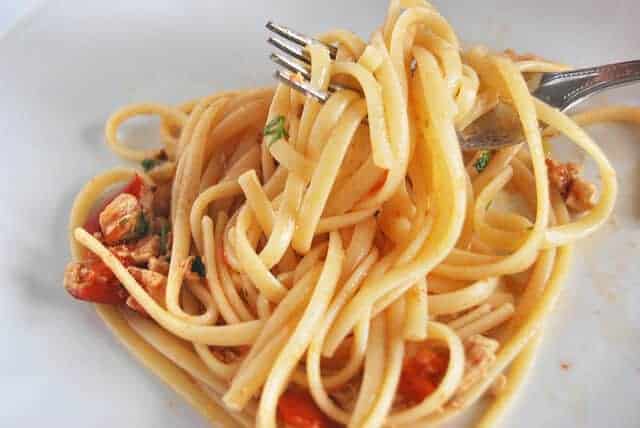Pasta has an unsavory reputation as a high-carb waist-expander, but new evidence shows that a serving of spaghetti may be a ticket to losing weight.
Researchers from St. Michael’s Hospital in Toronto took a fresh look at more than two dozen previously conducted scientific trials involving pasta consumption and came away with new insight that may overturn how most people view the cabinet staple.

“The study found that pasta didn’t contribute to weight gain or increase in body fat,” said lead author Dr. John Sievenpiper, a clinician scientist with the Clinical Nutrition and Risk Modification Center at St. Michael’s Hospital.
“In fact, analysis actually showed a small weight loss,” added Sievenpiper.
The researchers suggest that because most pasta contains a low glycemic index count, which means it doesn’t drive up the body’s blood sugar too quickly, it is a healthier option than many other wheat-based foods, such as breads and cereals.
The researchers looked at health data of more than 2,500 study participants who ate pasta in place of other carbohydrates. The participants consumed an average of about 3.3 servings of pasta per week instead of other carb-based foods. At the end of 12 weeks, the study participants had lost about 1.1 pounds on average.
“Contrary to concerns, perhaps pasta can be part of a healthy diet, such as a low [glycemic index] diet,” said Sievenpiper.
Keeping sugars in check
Sticking to a low glycemic index diet helps control blood-sugar levels, which is critical for patients with diabetes, and also for the health of the general population. Many processed foods, such as breakfast cereals and instant oatmeal, have a high glycemic index score. Pastas, such as spaghetti, however, rate relatively low, according to a Harvard Health review of sugar content in foods.
“Pasta has a similar [glycemic index] compared with many fiber-rich carbohydrates, including barley, legumes and steel cut oats, and still a lower GI compared with other fiber-rich foods including whole-wheat bread, breakfast cereals like bran flakes and potatoes with skin,” write the researchers in BMJ Open.
The new research adds to previous findings that support pasta’s place as part of a healthy diet.
Related: Fructan Carbs, Not Gluten, May Actually Be the Cause of Gut Issues
“One trial done in children in Spain given Mediterranean dietary advice, which included increasing the intake of pasta, found that approximately 11.3 percent of the participants in the Mediterranean diet group who were classified as overweight and obese changed their weight status to normal weight compared with only approximately 2.6 percent of the participants in the control group,” they write.
While pasta itself can be a healthy part of the diet, researchers warn against heavy sauces and sides, such as meatballs, that often accompany a bowl of macaroni. Avoid those big calorie indulgences, and you have no reason to worry about adding more noodles to your daily diet.
“In weighing the evidence, we can now say with some confidence that pasta does not have an adverse effect on body weight outcomes when it is consumed as part of a healthy dietary pattern,” said Sievenpiper.
Richard Scott is a health care reporter focusing on health policy and public health. Richard keeps tabs on national health trends from his Philadelphia location and is an active member of the Association of Health Care Journalists.


![How To: ‘Fix’ Crepey Skin [Watch]](https://cdn.vitalupdates.com/wp-content/uploads/2017/05/bhmdad.png)












